(1) March to MINUSTAH and US Embassy
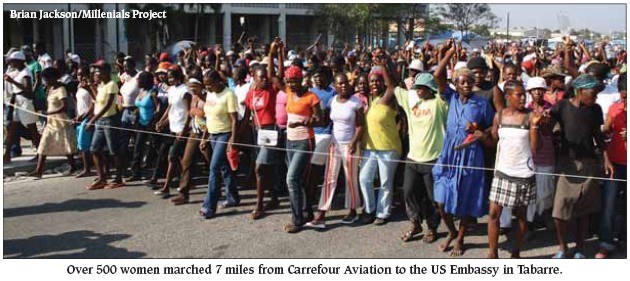
500 women march on MINUSTAH
and U.S. Embassy to demand “Tents, not guns!”
by Christian Guerrier and Brian Jackson
Christian Guerrier and Brian Jackson, both based in the Miami, Florida area, visited Haiti from Feb. 1 - 9. They are with the Millennials Project, an organization dedicated to the empowerment of women.
Haïti Liberté Vol. 3 No. 31 • Du
17 au 23 Février 2010
Source
We traveled to Haiti with the idea that women would emerge to lead in rebuilding and reshaping the country’s future after the devastating Jan. 12th earthquake. Arriving by bus from the Dominican Republic, we stayed in makeshift tents at Port-au-Prince’s Carrefour Aviation Base, near the community of Pont Rouge, where Christian had lived as a boy. Prior to our arrival, we had heard from news reports that women were having difficulty obtaining the aid that was being distributed. When we arrived, it appeared that nobody was receiving such aid. It was quite clear that the most pressing need among the hundreds of thousands of internally displaced was tents. Having toured much of Port–au– Prince by car, we had observed no more than a few hundred tents spread between a handful of locations. Throughout the week, we spent the better part of our time organizing the women at Carrefour Aviation and going back and forth to the United Nation’s Mission to Stabilize Haiti (MINUSTAH) Logistics Base, in the airport’s northeast corner, where most of the foreign aid groups were stationed. We spoke with no less than two dozen representatives from organizations such as the UN Children’s Fund (UNICEF), the UN Refugee Agency (UNHCR), the International Organization for Migration (IOM), The Red Cross, the World Health Organization (WHO) and the UN World Food Programme (WFP), none of whom could tell us how many tents were available, where they were, or why they were not being distributed.
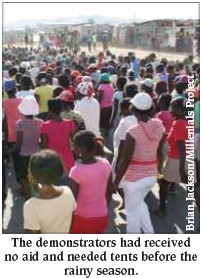 The
general consensus was that IOM was primarily responsible for the handling of
tents, however, when we met with its representative, Louis (no last name
provided), he claimed that the organization’s resources had dried up, that there
was no cache of tents waiting for distribution. “Unless the American people
decide to turn the tap back on, there’s nothing we can do,” he said. The
following day, we met a UNHCR representative. The organization supplies tents
for the camps of many internally displaced people around the world, but it is
not mandated to work in Haiti. He explained to us that UNHCR had offered to
provide additional tents, but was told by the IOM that it had “more than
enough.” We finally attempted to have a group of eight women from the Pont
Rouge community admitted to the MINUSTAH Base to speak directly with the
representatives of these NGOs, who generally did not want to cooperate with the
Millennials Project, it being a new U.S.- based organization that they had never
heard of. These women (called the Haitian Women’s Leadership Council) could
assess and articulate the needs of their community better than any foreign team
of aid workers possibly could, and they were willing and able to coordinate the
distribution of materials. Despite making the effort of traveling to the
MINUSTAH Base, the women were not even allowed in the gate of the walled-in
compound. The two of us went into the base to talk with NGO representatives, but
they refused to admit the women’s delegation. It was turned away.
The
general consensus was that IOM was primarily responsible for the handling of
tents, however, when we met with its representative, Louis (no last name
provided), he claimed that the organization’s resources had dried up, that there
was no cache of tents waiting for distribution. “Unless the American people
decide to turn the tap back on, there’s nothing we can do,” he said. The
following day, we met a UNHCR representative. The organization supplies tents
for the camps of many internally displaced people around the world, but it is
not mandated to work in Haiti. He explained to us that UNHCR had offered to
provide additional tents, but was told by the IOM that it had “more than
enough.” We finally attempted to have a group of eight women from the Pont
Rouge community admitted to the MINUSTAH Base to speak directly with the
representatives of these NGOs, who generally did not want to cooperate with the
Millennials Project, it being a new U.S.- based organization that they had never
heard of. These women (called the Haitian Women’s Leadership Council) could
assess and articulate the needs of their community better than any foreign team
of aid workers possibly could, and they were willing and able to coordinate the
distribution of materials. Despite making the effort of traveling to the
MINUSTAH Base, the women were not even allowed in the gate of the walled-in
compound. The two of us went into the base to talk with NGO representatives, but
they refused to admit the women’s delegation. It was turned away.
After getting no help and no answers except those that we ourselves were able to deduce from a series of verbal inconsistencies, we decided with the women to organize a public demonstration. Since the Haitian Women’s Leadership Council would not be admitted into the MINUSTAH base to voice their concerns, we chose to have a mass march to the base the following day. Throughout the week, huge rallies had been taking place each afternoon at an amphitheater located in the Carrefour Aviation area. By Thursday, February 4, we had amassed about 500 people from the community
The march took place on Friday, Feb. 5th, led by a banner reading "January 12 Movement to Liberate Haitian Women." Beginning at Pont Rouge, the crowd of over 500 women marched 20 abreast, with a number of men providing a protective security perimeter around the women. The demonstrators came first to the airport, stopping all traffic along the way. They then proceeded to the Central Directorate of the Judicial Police (DCPJ), which has also been President René Préval’s residence and office since the disaster. The demonstrators briefly blocked the DCPJ’s entrance as they marched by. Haitian police began hitting the men guarding the demonstration’s perimeter with clubs. Despite this provocational brutality, the protestors remained commendably peaceful throughout the march. People joined the procession as it passed. The protestors joined hands, singing traditional Haitian songs and chanting the slogan “Tents, not guns!” in Kreyòl. The march paused again in front of the MINUSTAH Base, and then finally continued on to the U.S. Embassy in Tabarre. The entire march from Pont Rouge to Tabarre is about 7 miles. In a radio address, President Préval claimed to have heard about the march and commented that it should not happen again.
On the evening of Feb. 7, it rained for the first time since the earthquake, auguring the rainy season which starts in March. The vast majority of residents in Haiti’s “sheet cities” still have no tents to shelter them. On February 9, the "January 12 Movement to Liberate Haitian Women," again with the Millenials Project’s support, staged a sit–in on the Champs de Mars outside the Plaza Hotel...
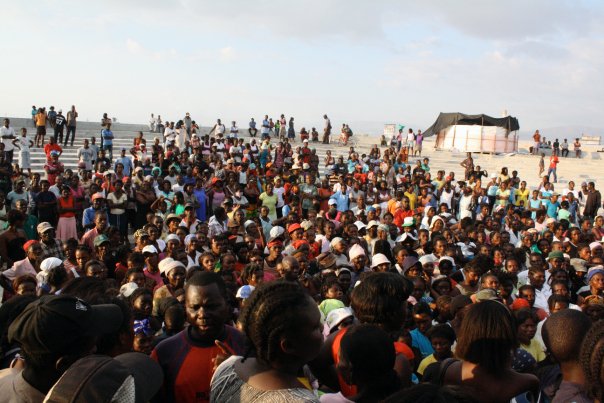
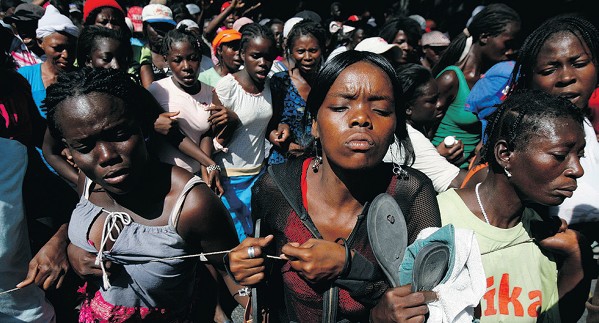
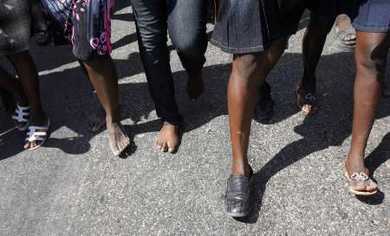
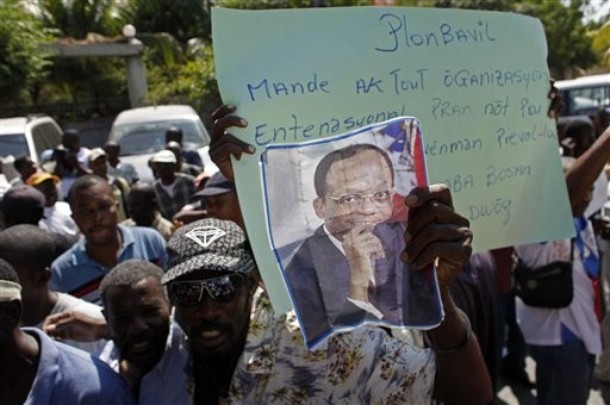
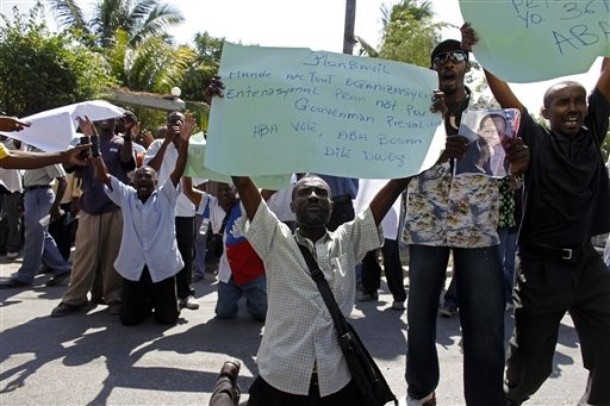
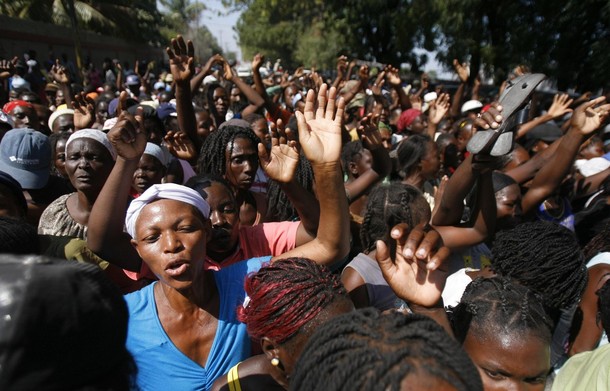 Survivors
of Haiti's earthquake protest to demand tents in front of temporary offices
of the Haitian government before Former U.S. President and United Nations
Special Envoy for Haiti, Bill Clinton's visit in Port-au-Prince February 5,
2010. The aid operation in Haiti has been complicated and frustratingly
slow...
Survivors
of Haiti's earthquake protest to demand tents in front of temporary offices
of the Haitian government before Former U.S. President and United Nations
Special Envoy for Haiti, Bill Clinton's visit in Port-au-Prince February 5,
2010. The aid operation in Haiti has been complicated and frustratingly
slow...